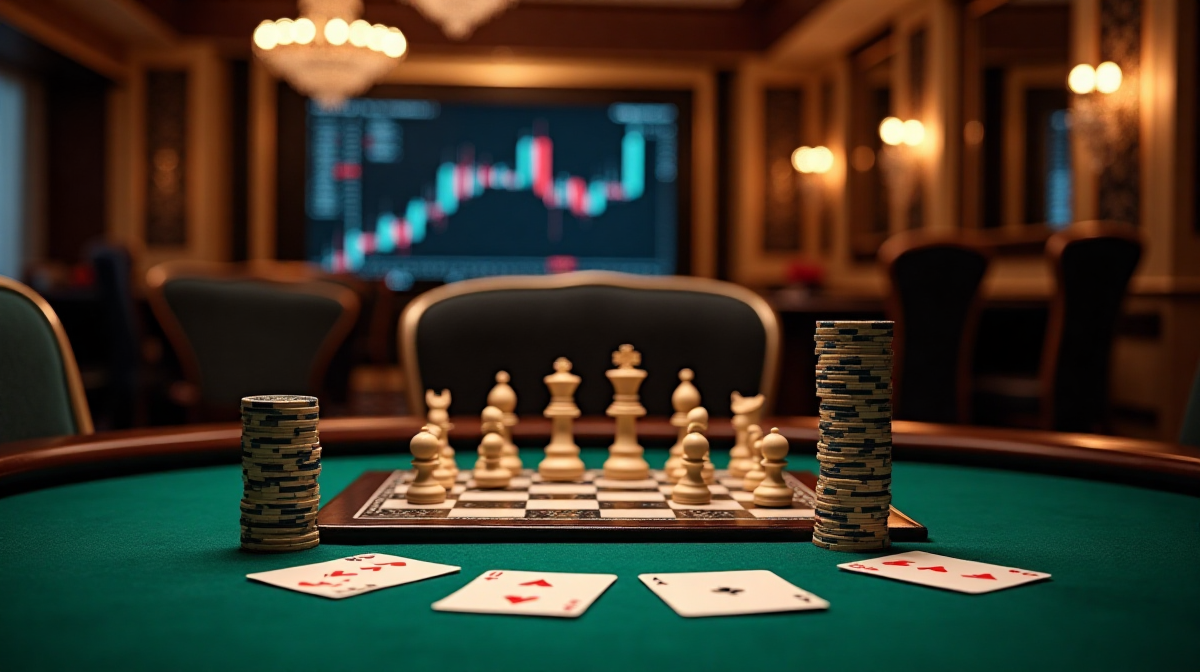Poker & Chess: What’s the Winning Move?
The Unexpected Parallels – Setting the Stage
For centuries, chess and poker have captivated minds with their intricate strategies and demands for intellectual prowess. While seemingly disparate – one played on a checkered board with static pieces, the other around a felt table with cards and chips – a closer examination reveals surprising parallels. Both games are battles of wits, requiring foresight, calculation, and a keen understanding of human psychology. Understanding these connections can enhance your gameplay in both arenas, and even offer valuable lessons applicable beyond the board and table. Many enthusiasts also enjoy combining their strategic thinking with online betting platforms like mybet.
Why Compare Poker and Chess? – Strategic Thinking & Skill
The comparison isn’t merely superficial. Both chess and poker are games of imperfect information, though to drastically different degrees. They both necessitate planning several moves ahead, anticipating your opponent’s reactions, and adapting to constantly evolving circumstances. The allure isn't just about luck; it’s about the skillful application of strategy, the ability to assess risk, and the discipline to follow a calculated plan. A quick check for mybet today correct score predictions might offer a different kind of strategic challenge, but the underlying principles of analysis remain consistent.
Defining “Winning” – Beyond Just Victory
Winning isn't always about checkmate or emptying your opponent's stack. It’s about maximizing your expected value (EV) over the long run, making optimal decisions even when facing setbacks. It's about consistently outplaying your opponents, recognizing advantageous situations, and minimizing losses. This concept of long-term success is crucial in both games, and even extends to responsible betting practices, such as those found in mybet com shop bet options.
The Art of Calculation & Probability
Assessing Risk – Poker’s Odds & Chess’s Material Balance
At the heart of both games lies a constant assessment of risk. In chess, this translates to evaluating material imbalances – is sacrificing a pawn worth gaining a positional advantage? In poker, it’s calculating pot odds and implied odds to determine if a call is profitable. Both require a quantitative understanding of potential rewards versus potential losses.
Expected Value – A Hidden Connection
The concept of Expected Value (EV) is a cornerstone of successful poker play, but it’s equally applicable to chess. Every move in chess has an associated EV – the expected outcome based on the probabilities of future scenarios. A strong chess player, like a seasoned poker player, is constantly seeking moves with the highest positive EV.
Long-Term vs. Short-Term Thinking – Patience and Perseverance
Both chess and poker demand patience and a long-term perspective. Short-term variance – a bad beat in poker, or an unexpected tactical combination in chess – can momentarily disrupt your plans. However, consistently making sound, EV-positive decisions over time will inevitably lead to success. This is where the saying “chess is to checkmate as poker is to” embodies the essence of achieving the ultimate goal in each game.
Psychological Warfare: Reading Your Opponent
Tells and Patterns - Observing Behavior in Both Games
A skilled poker player is adept at reading “tells” – subtle physical or behavioral cues that reveal information about an opponent’s hand. Similarly, a chess player can learn to recognize an opponent's tendencies – their preferred openings, their typical responses to certain positions, and their risk tolerance.
Bluffing & Deception – Beyond the Poker Table
Bluffing is a core element of poker, but deception also plays a role in chess. Creating traps, offering seemingly obvious sacrifices, or subtly influencing your opponent’s thought process can all be forms of psychological warfare.
Intimidation & Control - Influencing Opponent Decisions
Controlling the table image in poker, or establishing a dominant presence in chess, can influence your opponent’s decisions. An intimidating player might induce opponents to make mistakes, while a confident demeanor can project strength and control.
Pattern Recognition & Memory
Recognizing Common Openings and Betting Patterns
Both games rely heavily on pattern recognition. Chess players memorize common opening variations and tactical motifs. Poker players learn to identify betting patterns that signal hand strength or weakness.
Recalling Past Hands/Games – Learning from Experience
Reviewing past hands in poker, or analyzing completed chess games, is crucial for identifying mistakes and improving your game. Memory plays a vital role in recalling specific scenarios and applying those lessons in future situations.
Adapting to Opponent Tendencies
The ability to adapt to your opponent's style is paramount. A tight, passive player requires a different approach than a loose, aggressive one. Similarly, recognizing your opponent’s strengths and weaknesses in chess allows you to tailor your strategy accordingly.
Information & Uncertainty
Complete vs. Imperfect Information – Chess’s Transparency vs. Poker’s Hidden Cards
Chess is a game of complete information – both players have full knowledge of the board state. Poker, however, is a game of imperfect information – players only see their own cards and observe their opponents’ actions. Understanding this difference is fundamental to developing effective strategies in each game.
The Role of Luck & Variance – Poker's RNG & Chess's Calculated Consequences
Luck plays a significant role in poker, particularly in the short run. The random dealing of cards introduces variance that can impact individual hands. Chess, while still subject to occasional unexpected events, is largely deterministic – the consequences of each move are more predictable. However, even in Texas holdem poker, skill is the dominating factor over the long term.
Managing Uncertainty - Adapting Strategies to Limited Knowledge
In both games, you must make decisions based on incomplete information. Poker players use probability and deduction to estimate their opponents’ hands. Chess players assess the risks and rewards of various moves based on their understanding of the position.

Game Structure & Tempo
Fixed vs. Dynamic Stacks – Bet Sizing in Poker vs. Material Advantage in Chess
Bet sizing in poker directly impacts stack dynamics. Larger bets exert more pressure, while smaller bets can induce calls. In chess, material advantage is a relatively fixed quantity – a queen is always worth more than a pawn.
Aggression vs. Positional Play – Identifying Appropriate Tactics
Aggressive play, characterized by frequent betting and attacking moves, can be effective in both games. However, positional play – controlling key squares in chess, or dominating the table in poker – is often a more sustainable long-term strategy.
Endgame Strategies - Differing Approaches to Closing Out a Win
Endgames in chess require precise calculation and a deep understanding of pawn structures. Endgames in poker often involve navigating complex bet sizing and managing risk to extract maximum value from your hand.

The Importance of Range vs. Specific Moves
Poker’s Betting Ranges - Thinking in Probabilities, Not Certainties
Poker players think in terms of “ranges” – the set of possible hands their opponent might hold. This probabilistic approach is essential for making informed decisions.
Chess’s Candidate Moves – Evaluating Concrete Variations
Chess players evaluate “candidate moves” – the most promising options in a given position. They then analyze concrete variations to determine the best course of action.
The Value of Flexibility in Both Games
Rigidity in your thinking can be a fatal flaw in both chess and poker. The ability to adapt to changing circumstances, adjust your strategy, and exploit your opponent’s weaknesses is crucial for success.
Applying Chess Principles to Poker
Chess Strategy in a Poker Context
Positional Advantage - Understanding Stack Size & Table Position
Just as controlling the center of the board is crucial in chess, table position and stack size are vital in poker. A favorable position allows you to act last, giving you more information and control.
Piece/Chip Value – Assigning Relative Worth to Your Holdings
Understanding the relative value of your pieces in chess translates to understanding the relative strength of your hand in poker.
Sacrifices & Calculated Risks - When to Gamble for a Larger Reward
Sometimes, sacrificing a piece in chess, or making a large bet in poker, is necessary to achieve a larger strategic goal.
Poker Tactics in Chess
Bluffing – Creating Traps & Psychological Pressure
While direct bluffing isn't possible in chess, you can create traps and psychological pressure to induce your opponent to make mistakes.
Bankroll Management – Conserving Resources & Avoiding Overextension
The principle of bankroll management in poker – protecting your capital and avoiding ruin – can be applied to chess by carefully managing your pieces and avoiding unnecessary risks.
Reading Opponent Style – Predicting Future Actions
Just as you try to read your opponent’s hand in poker, you can try to predict their future actions in chess based on their playing style.
Cultivating the Winning Mindset
Discipline and Emotional Control
Tilt & Its Impact – Managing Frustration in Both Games
“Tilt” – the emotional state of frustration and irrationality – can be devastating in both games. Learning to manage your emotions and maintain discipline is essential for making sound decisions.
Staying Focused – Minimizing Distractions & Maintaining Concentration
Concentration is paramount in both chess and poker. Minimizing distractions and maintaining focus allows you to analyze the situation more effectively.
The Importance of Review and Analysis – Learning from Mistakes
Analyzing your games – identifying mistakes and areas for improvement – is crucial for continuous growth.
Continuous Learning & Improvement
Studying Theory – Opening Principles, Game Theory Optimal play
Studying opening principles in chess, or learning Game Theory Optimal (GTO) strategies in poker, can provide a solid foundation for your game.
Analyzing Your Games – Identifying Weaknesses & Areas for Growth
Regularly reviewing your games and identifying your weaknesses is essential for continuous improvement.
Seeking Mentorship & Feedback – Learning from Experienced Players
Learning from experienced players can accelerate your growth and provide valuable insights.
Conclusion: The Universal Appeal of Strategic Mastery
The Enduring Lessons – What Poker & Chess Teach Us About Life
Poker and chess are more than just games; they are metaphors for life. They teach us the importance of strategic thinking, risk assessment, discipline, and emotional control.
Embracing Complexity – The Rewards of Mental Agility
Both games demand mental agility and the ability to embrace complexity. The more you challenge your mind, the more resilient and adaptable you become.
The Pursuit of Skill – A Lifelong Journey of Learning and Improvement.
Mastering chess or poker is a lifelong journey. There's always something new to learn, a new strategy to explore, and a new challenge to overcome. Whether you’re considering a foray into the world of online betting with platforms like mybet, or simply refining your skills at the chessboard, the pursuit of strategic mastery is a rewarding endeavor.

